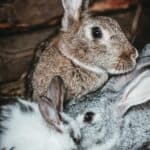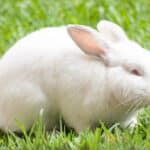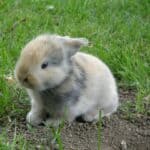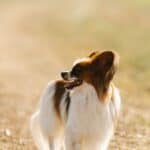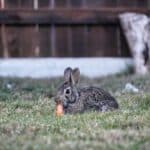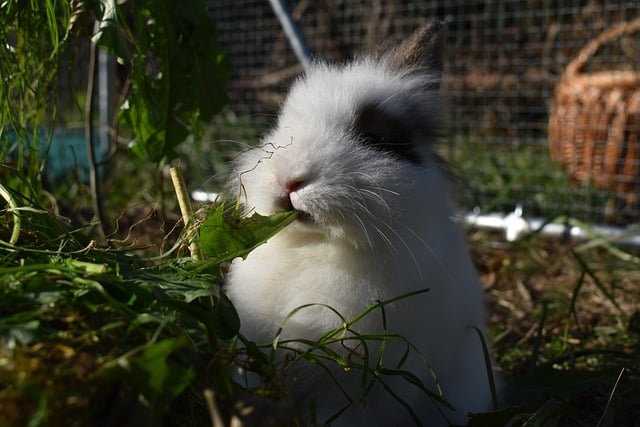
Have you ever wondered what to eat dwarf rabbits? This is a very frequently asked question. And it is that a good diet is essential for your little rabbit to have a long and healthy life. I anticipate that they do not eat carrots as we have been led to believe in the movies.
Feeding a dwarf rabbit correctly is not an easy task as the digestive system of dwarf rabbits is something special. These adorable pets can take up to 2 days to digest due to their passive bowel function.
The digestive system of a rabbit
Before starting with the type of diet, it is important to know how special rabbits are in their way of digesting food, and therefore, the importance of a correct diet.
The digestive system of rabbits is very peculiar. They have a small stomach with thin and not very muscular walls, so their digestions are slow and delicate.
Food moves through the small intestine pushed by the previous piece of food, which in turn moves as it is pushed by the previous one, and so on. This is what is called passive transit. It is for this reason that the food that rabbits eat takes several days to pass through the digestive tract. A rabbit needs to eat at all times so that the transit of food is maintained, Therefore, it is important that we feed our dwarf rabbit, several times a day in small quantities.
It is important that the food they eat contains a large amount of cellulose, and not too many simple sugars or starch, since they have a rapid fermentation in the slow intestinal transit of our bunnies.
You will surely be surprised to see your rabbit eat its feces, however this is especially important to stay healthy as rabbits synthesize vitamins in their appendix and then absorb them again through their feces.
So, are rabbits herbivores?
Rabbits are herbivorous animals , that is, their diet is based on foods of plant origin. This power varies with the needs that have in each stage of its life, but the main source of power is the hay, which should be available in an unlimited, and feed specific rabbit depending on the weight and age of your pet. It is also advisable to supplement your rabbit’s diet with fresh green leafy foods, such as vegetables.
Their diet becomes an essential factor for our pet to enjoy good health.
What do newborn dwarf rabbits eat?
The digestive system of newborn rabbits is very susceptible to changes in their environment. A drastic drop or rise in temperatures or a too sudden variation in your diet can seriously affect your health.
- Up to 3 weeks it is advisable to feed a rabbit only with milk, it can be breast milk, or one that replaces it.
- After 3-4 weeks you should continue feeding your rabbit with milk, but you can start adding alfalfa, which will provide it with the calcium and protein it needs .
- From 12 weeks you can start to include different types of vegetables. Vegetables must be varied. You can add one or two pieces of different vegetables twice a week keeping in mind that we must let our rabbit become familiar with these new foods.
- From 9 months on, our rabbit’s diet will be like that of an adult specimen.
What do adult rabbits eat?
The adult rabbit’s diet should be made up of three main elements: Hay, fresh food and quality feed. Of these, hay plays a fundamental role due to its contribution of fiber and should make up most of the diet of a healthy bunny. Other elements such as fruit we will give them in a very limited way, they are good options as prizes. The commercial treats that are sold for rabbits are usually very unhealthy and are not recommended.
In general, we could divide the rabbit’s diet as follows:
- 70% -80% hay or fresh grass
- 20% fresh food (leafy vegetables or wild herbs)
- Complements: high-end feed and healthy “sweets” or fruits as a reward.
- Without forgetting the most important element of your diet: water.
What are the foods that dwarf rabbits eat?
The hay:
It should always be available in unlimited quantities and we must ensure that the rabbit eats enough. If our bunny does not eat enough hay, it will be urgent to start a food re-education program before the first health consequences begin to emerge.
At home it has cost us a lot to get Tambor to eat hay, we have tried different brands, drier, greener and finally the one that it liked the most is the TIMOTHY brand (with the branches as dry as possible). Timothy hay is quality hay, which is specially screened, carefully dried and with a high crude fiber content.
The hay should be fresh, green and smell good, this will make it more palatable and help them consume it in more quantity. The dry and yellowish hays retain their amount of fiber but have lost a lot of nutrients.
Fresh food and food supplements for a rabbit
In this section we include perishable plant foods that should be offered at least once a day and remove what has not been consumed in a few hours to avoid fermentation. Fresh food should be washed and dried, especially in summer (since wet and hot it is easier for them to ferment, proliferating dangerous bacteria) they should not be eaten very cold or directly from the refrigerator.
Fresh food includes:
- Leafy vegetables: Basic food. They should be given at least once a day.
- Other vegetables: They will be used as a reward or supplement to food
- Fruits: They will be used as a reward or supplement to food
- Aromatic herbs: They can be used as part of the basic diet or as a reward (depending on the type of herb in question)
Vegetables
We will especially choose green leafy vegetables that contain more nutrients.
Here is a list of vegetables that we can offer to our rabbits:
Vegetables that we can offer our rabbit daily
- Carrot leaves : The whole carrot is not recommended due to its excessive sugar content, however, you will love the leaves and they will seem delicious.
- Radish leaves : In the same way as with carrots, radish contains a lot of sugar so it is advisable to offer only the leaves.
- Endive : Excellent for the liver and a good supply of B vitamins and minerals.
- Watercress : Satiating and purifying plant, perfect for rabbits suffering from obesity.
- Arugula : In addition to providing sodium, arugula contains glucosinate, an effective component that is used in the fight against cancer. It is also useful for eyesight and good blood regulation.
- Clover : In addition to enchanting them, clover has various properties that can benefit our rabbit: it helps in the digestive system, helps treat degenerative problems such as arthritis and is also useful for rabbits that may suffer from respiratory problems.
- Lettuce : Hydrates a lot; but the Iceberg variety is not recommended at all for the rabbit’s diet as it can lead to severe diarrhea.
Vegetables that we can offer once or twice a week
- Artichoke
- Chard
- Basil (has a calming and stimulating effect on the appetite)
- Eggplant
- Parsley
- Cilantro
- Spinach
- Dill (very rich in vitamins, helps stomach discomfort and cramps, stimulates appetite)
- Tarragon
- Fennel leaves (Helps digestive problems)
- Lombarda
- Mint
- Oregano (useful for intestinal problems)
- Bell pepper (Red, green and yellow)
- Rosemary
- Thyme
- Whole carrot
Forbidden vegetables
- Potato
- Sweet potato
- Garlic
- Onion
- Turnip
- Leeks
- Mushrooms
- Green peas
- Broad beans
Aromatic herbs should be given in small amounts .
Some toxic plants can be
- Ferns
- Belladonna
- Hemlock
- Ivy
- Laurel
- Daffodils
- Poppies
- Tulips
- Mother jungle
Fruits
The fruits are generally a food that must be supplied with caution to rabbits. Despite being allowed foods or suitable for consumption, their high sugar content does not make them recommended as usual food. Due to its high sugar content, rabbits will only eat some fruit 1 or 2 times a week.
The ideal fruits are:
- Cherry (in moderation and its leaves more often)
- peach
- Strawberry (moderately, plus its leaves as is the case with cherry)
- Cherries
- Kiwi (very rarely, in small quantities)
- Apple
- Mango
- Papaya, helps eliminate hairballs
- Pear
- Pineapple, good to help with the hairball.
- Watermelon (preferably the rind)
- Blueberries (they have an anti-inflammatory effect on the mucous membranes of the mouth, stomach and bladder.)
There are fruits that rabbits should not consume:
- Cherimoya: in addition to being very rich in sugar, custard apple is a fruit that also contributes excessive fat to our rabbit. Its consumption should be avoided or offered very widely and in tiny portions. It is not a recommended food.
- Figs: despite being a very rich fruit with many properties, the fig has a very high amount of sugar that, as we have mentioned, is very harmful for our rabbit. It is a fruit to be avoided.
- The apricot, the medlar, the plum and the peach: these four fruits, despite providing vitamin A and fiber to our little friend, have in common the presence of cyanide in their seed. For that reason we should always cut it and wash it and never offer pieces of meat close to the seed.
- Avocado: contains a toxic compound called persin that is really harmful to the health of our rabbit as well as many other pets. It is a very harmful fruit that should never be offered. It also has a lot of fat.
- The banana: this food is very rich nutritionally speaking and provides vitamin B1. However, it contains high sugar and is also very difficult to digest. In addition, they should never be green, but ripe. For this reason, it is better to avoid the consumption of this food or to offer it in very few quantities.
Other prohibited foods for rabbits:
- Bread: Stale, old bread is completely unsuitable for feeding rabbits. After all, not only does it contain too much starch and other indigestible ingredients for animals, but it also does not help tooth wear, as it is absorbed relatively quickly in the rabbit’s mouth.
- Dairy products
- Vegetables
- Refined hydrates
- Corn
- Food of other animals
I think
It must be rationed. About a tablespoon in the morning and another at night.
A common misconception is that many people think that what dwarf rabbits eat is just feed. We have made this mistake for quite some time due to a recommendation. It took us a long time to reduce the feed, but in the end we have succeeded.
The feed is poorer in fiber than hay, it requires little chewing so there is no abrasive effect on the teeth and it can cause obesity if we feed it as the only food.
To know the quality of a feed we must see the composition. It should have a high percentage of fiber, above 20%, a fat level as low as possible and not have too much protein. Calcium should be around 0.6% for healthy adult rabbits and up to 1% for growing rabbits and lactating or pregnant females. For young or old rabbits a higher level of protein is desirable.
Reference values:
| Composition | Adult rabbits | Gazapos and lactating females |
|---|---|---|
| Crude fiber | greater than 20% | greater than 20% |
| Protein | 12-14% | 12-18% |
| Fat | 1-2% | 1-2% |
| Calcium | 0.6% | 0.8-1% |
The basis of the feed should be forage plants such as timothy or alfalfa. The main ingredient should never be cereals, flours or undefined elements such as “by-products of vegetable origin”
What do dwarf rabbits eat when they are sick?
There are different diets to feed a sick rabbit, but they are basically divided into two types, homemade and commercial:
Commercial diet:
There is an excellent brand on the market with one of the most complete lines for the care, feeding and attention of your rabbit. This is Oxbow, who runs a special line called Oxbow Critical Care, which is a highly nutritious powdered food specially designed to feed sick, weak or convalescent rabbits.
Homemade diet
If your rabbit eats on its own, feed them hay. If you can’t, give them some dandelion, clean grass, fresh alfalfa, spearmint, basil, coriander, parsley (yes, they are all safe, but you must disinfect them perfectly well before giving them). But if it no longer eats on its own, prepare the following for them:
- Buy commercial baby food that they sell canned, it can be pureed carrot or prune. Take a tablespoon and add a tablespoon of commercial rabbit food (rabbit, concentrate, feed, pellets) and mix until you get a smooth, not thick paste. Add a little water if necessary. Feed your rabbit with a syringe.
Check that your rabbit drinks enough water: its container should be clean and filled with fresh, drinkable water.
How to know if my rabbit has been intoxicated?
Despite carefully controlling the feeding of our rabbit, sometimes we can forget about some specific properties that some fruits and vegetables have. For this reason I have wanted to add this section.
- The rabbit has not eaten in more than 12 hours : especially if it has not consumed hay, we are facing a serious health problem.
- You have not had a bowel movement or urination in more than 12 hours .
- Obvious symptoms of listlessness, pain, malaise, or little activity.
- Overgrowth of rabbit teeth.
- Unusual stools or urine: very liquid, with mucus, abnormal color.
- Spam and abnormal movements.
- Vomiting and seizures
If we observe any of these symptoms, it will be essential to go to the vet as soon as possible for an emergency examination .

